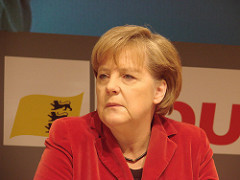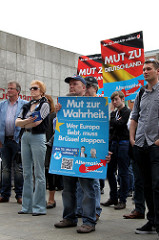Slovenia will keep its leader. But the Czechs and Austrians have elected new heads of state. However, in Germany the result is more complicated because of its election process.
Technically speaking, voters in Germany decide who will represent them in the lower house of parliament, the Bundestag; and the first job of the newly elected individuals is to elect a chancellor. But in reality, the party with the most votes, usually determines who leads the nation for the next four years. Typically, the party’s leader is selected. But there’s more.
A half dozen or more parties may be attempting to woo the voter. If the leading party does not receive a majority of the votes, as regularly is the case, the head of the party tries to strike a deal with at least one other party. The idea is that together the coalition forms a majority and then can successfully govern.
If no coalition can be formed, another vote, referred to as a snap election, may be scheduled. The only other option left is to attempt to try governing as a minority, or lame duck administration, using the British sense of the term.
Rough Going for CDU
 Nearly two months ago Chancellor Angela Merkel’s political party, the CDU/CSD bloc, won the most seats in the parliament but not a majority of them. Her previous coalition partner again won the next largest number of seats but chose not to be the junior partner in a new coalition. So after the election the incumbent chancellor and CDU sought to form one with two other parties.
Nearly two months ago Chancellor Angela Merkel’s political party, the CDU/CSD bloc, won the most seats in the parliament but not a majority of them. Her previous coalition partner again won the next largest number of seats but chose not to be the junior partner in a new coalition. So after the election the incumbent chancellor and CDU sought to form one with two other parties.
Those two smaller parties, the Greens and the FTP, held polar opposite views from each other and negotiations were contentious.
Agreement could not be reached by the self-imposed deadline of Friday the 17th of November, especially on the topic of migration, therefore, the deadline was extended until Sunday. But, according to DW’s news site, they completely collapsed after the FTP walked out.
If a snap election is called, one DW TV newscaster questioned last week whether Chancellor Merkel would have a fourth term after all. And that’s not the only thing potentially subject to change.
AfD Celebrates
 Der Spiegel had published a pre-election article in its September 9, 2017 issue titled, “AfD Sets its Sights on German Parliament”. Its article stated,
Der Spiegel had published a pre-election article in its September 9, 2017 issue titled, “AfD Sets its Sights on German Parliament”. Its article stated,
“Germany now finds itself faced with a historic turning point. On Sept. 24, it looks as though a party that has racist and nationalist tendencies will win seats in the Bundestag. … And the party won’t just change the face of the German parliament, but likely also its culture of political debate.”
AfD became the 3rd biggest party; it won over 90 seats. The DW TV newscaster said with a new election AfD could gain more.
No Joy in Paris
What happens next in Germany will affect others as well.
French President Macron hitched his goal of a fiscally integrated EU core to Chancellor Merkel being able to steer Germany in a similar direction. A September 26, 2017 DW article titled, “Macron: more Europe, please” pointed out the two governments did not agree on some things. However,
“In August, Merkel backed Macron’s call for a new powerful eurozone finance minister post to oversee economic policy across the bloc. She said the new role could provide “greater coherence” to economic policy. “
The DW article,“Macron’s eurozone plans put eastern EU members on the spot”, posted on September 28, 2017, indicated that President Macron’s cause was not helped by the outcome of the 2017 German Federal election. It reported that,
“German Chancellor Angela Merkel has said … she will likely be obliged to taper her government’s policies to meet the demands of her most probable coalition partners, in particular the liberal Free Democrats (FDP), a party that has been largely critical of the French president’s ideas on Europe.”
Limited Options
Since those coalition talks have failed, another way forward must be found. DW wrote on November 19, 2017 that the Chancellor could try to form a minority government with the Greens party or try to convince the SPD to reconsider. Otherwise, DW thought a snap election would be “the only viable solution”.
In a re-vote, perhaps some CDU-CDS voters would switch to the central left SPD. They could view a chance of the central right CDU possibly becoming SPD’s junior partner as the least objectionable option left. Indeed, maybe something like that was SPD’s post-election strategy all along. Others think a good number of voters would choose instead to swing significantly further to the right.
The DW TV newscaster concluded his comments about the coalition talks by saying what many were thinking,
“Much is at stake.”
Photo Credits: Chancellor by Savas Savidis, License: CC BY-NC-SA 2.0; AfD by strassenstriche.net, License: CC BY-NC 2.0.